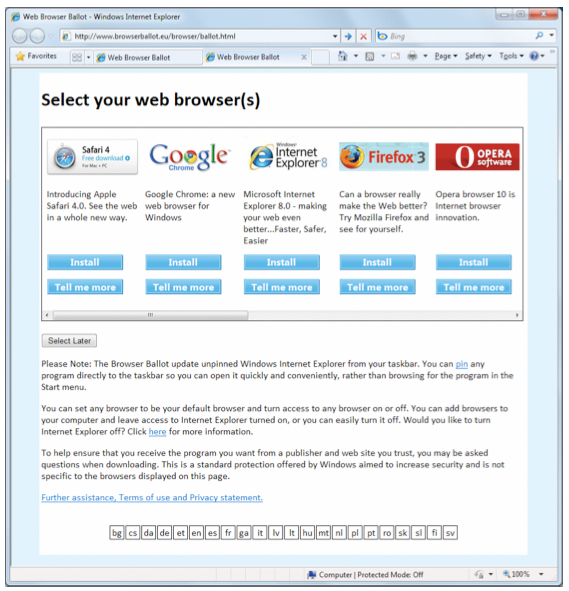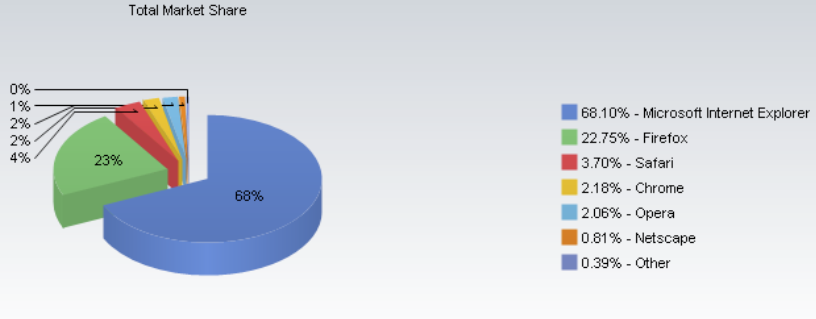Apple's Safari gets prime placement in Windows browser ballot
The design caught the ire of Jenny Boriss, a Firefox designer, who believes that the layout gives an unfair advantage to Safari over competing browsers. Her personal comments were not made on behalf of the Mozilla Foundation.
"Windows users presented with the current design will tend to make only two choices: IE because they are familiar with it, or Safari because it is the first item," she said.
Microsoft plans to offer the ballot screen in response to an ongoing antitrust dispute with the European Union.
After it was alleged that the Windows maker was engaging in anticompetitive practices, Microsoft was forced to release versions of its operating system without Windows Media Player bundled. Apple's rival to the north was also ordered to pay €497 million for alleged abuse of its dominant position in the market.
Early this year, the European Commission warned Microsoft that it believed the inclusion of Internet Explorer in Windows was an abuse of its stance in the market. The legal body argued that the ubiquity of Internet Explorer forces Web developers and programmers to optimize mostly or exclusively for the Microsoft browser, limiting the number of features available to users.
Due to launch on Oct. 22, Windows 7 will allow PC vendors to choose which Web browser they want to install on their hardware. Manufacturers can opt for Microsoft's own Internet Explorer, or choose another option instead.
After reviewing Microsoft's browser ballot, the option earned praise from the European Commission. A market test was conducted, and found that the new method provides greater information to consumers about Web browsers.
"The improvements that Microsoft has made to its proposal since July would ensure that consumers could make a free and fully informed choice of Web browser," the commission said. "Microsoft has in particular agreed to present users with a first screen explaining what web browsers are. 'Tell me more' buttons for each browser would also enable users to learn more about the web browser they may wish to install. The user experience would be better and the choice screen would better represent competing browser vendors. Finally, the proposed commitment would now be subject to a clause allowing the Commission to review it in the future to ensure that consumers would continue to have a genuine choice among browsers."
But Boriss said she believes a ballot isn't the right way to go, and the current design gives a "disproportionate advantage" to Apple's Safari. She cited studies that found that in traditional elections, lesser-known candidates can have their vote totals boosted by as much as 50 percent if their name is listed first.
She went on to say that Safari is not an "ideal" browser for Windows, as Apple puts more focus on software for its own Mac OS X platform than it does for Windows. She said that Safari is the least likely to be the browser Windows users want. She offered a number of alternatives, including random order of the top five browsers, or probability ordering by percentage market share.
"Past consumer choice has shown that Safari does not provide an ideal browsing experience on Windows," she said. "Taking IE out of the equation because of its advantage as the bundled browser, the free market really does show what Windows users prefer. Safari has the smallest market share of the five other browsers at 2.6 percent."
The overall share os Safari has increased steadily in recent years, thanks to increasing Mac sales, as well as the browser's availability for Windows. According to Net Applications, Safari has an overall 3.70 percent market share among all browsers.
When it launched in June, Safari 4 got off to an explosive start, with 11 million downloads of the browser within its first 3 days. More than half of those downloads — 6 million — were to users of Microsoft Windows operating systems.
 Katie Marsal
Katie Marsal












 Mike Wuerthele
Mike Wuerthele

 Malcolm Owen
Malcolm Owen
 Chip Loder
Chip Loder

 William Gallagher
William Gallagher
 Christine McKee
Christine McKee
 Michael Stroup
Michael Stroup






